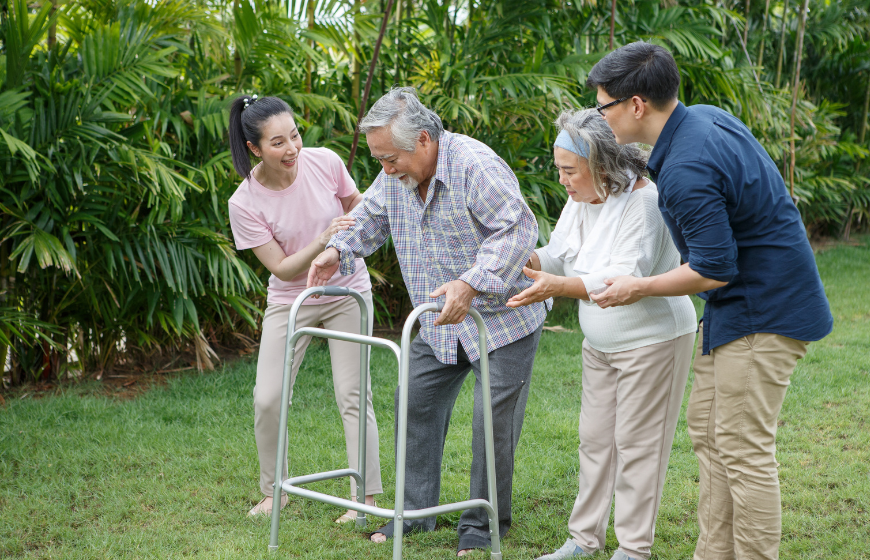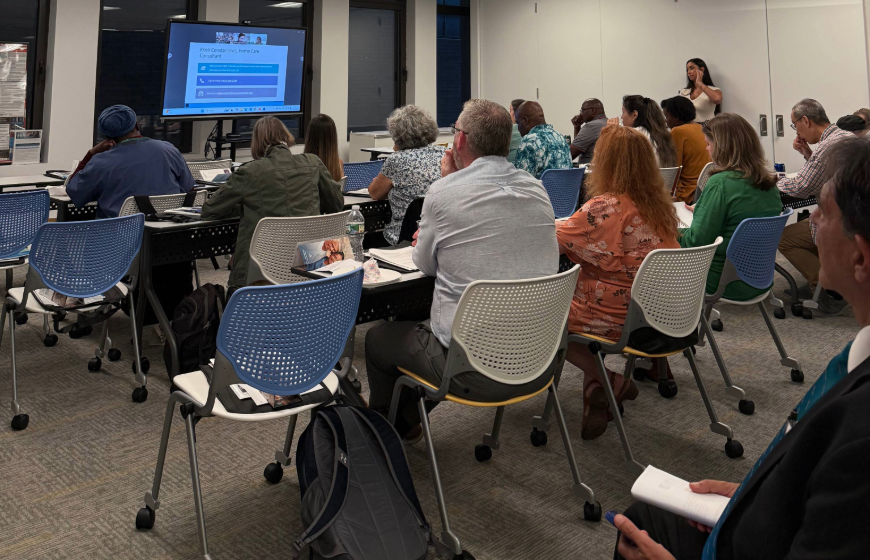Aging is normal. As we get older, we gain wisdom, cherished memories, and long-lasting relationships. However, with age comes increased health concerns—both physical and emotional—that can be difficult to manage. There are a few options like in home nurse care and home medical assistance that can help elderly patients experiencing any of these age related diseases.
That’s why it’s good to know some of the most common old age diseases so that you can monitor your health (and we have a list of those conditions right here).
These conditions, while commonly thought of as age related diseases, can occur in younger people as well, but the risk becomes greater in older adults. In people over the age of 65, 80% will have at least one chronic condition and 68% of people will have two or more.1 That’s why it’s important to be knowledgeable and ready to deal with any condition you may develop. It’s also important to make use of different types of long term care for an age related disease.
But First, What Is Aging?
While most people have some concept of aging, it can often remain abstract. We understand that we get older, but why does that mean we become more susceptible to disease?
Biologically, aging is an accumulation of molecular and cellular damage over time. This damage results in a gradual decrease in physical and mental capacity, which is why our risk of disease increases the older we get.2
The good news is that medical science and sociological advancements mean that more people than ever are living into old age. Between 2015 and 2050, the proportion of people over the age of sixty as a percentage of the overall population is expected to nearly double. This means old age diseases will become even more common with an increase in the elderly population.
Top 10 Chronic Conditions
Since we know more people are living into and past their sixties, knowing what conditions are likely to affect the elderly can help us prepare for these years. The top ten chronic conditions likely to affect older patients and people over the age of 65 and the percentage of people they are likely to affect are:3
- Hypertension (58%)
- High Cholesterol (47%)
- Arthritis (31%)
- Ischemic/Coronary Heart Disease (29%)
- Diabetes (27%)
- Chronic Kidney Disease (18%)
- Heart Failure (14%)
- Depression (14%)
- Alzheimer’s Disease and Dementia (11%)
- Chronic Obstructive Pulmonary Disease (11%)
Let’s look at each of these briefly to give a better idea of what each condition is as well as some ways you can help reduce your risk of each.
#1 Hypertension
Hypertension is more commonly referred to simply as high blood pressure. It occurs when your heart pumps more blood than your arteries can easily handle, which leads to your arteries resisting the blood flow and your blood pressure going up. This is a concerning condition because it can often lead to serious complications like a stroke or heart attack.
Some ways to help prevent high blood pressure include:
- Keep a healthy weight.
- Try to reduce stress.
- Exercise – both aerobic and strength exercises can help.
- Maintain a healthy diet. Specifically, try to limit salt and alcohol consumption.
It’s also a wise idea to monitor your blood pressure regularly. The sooner you catch signs of hypertension, the more likely you can take steps to prevent the worst outcomes.
#2 High Cholesterol
High cholesterol is a condition in which someone has too much low-density lipoproteins or LDL in their body. LDL is also known as “bad cholesterol,” and can lead to cholesterol build-up in arteries and heart disease.
Some ways to prevent high cholesterol include:
- Keep a healthy weight
- Exercise regularly
- Quit smoking and limit your alcohol consumption
- Maintain a healthy diet, specifically, avoid trans fats and saturated fats.
#3 Arthritis
Arthritis is an inflammation of your joints that can cause pain and make it difficult to move. The most common form of arthritis is osteoarthritis, a degenerative joint disease more likely to occur in women.4
Ways you can prevent or manage arthritis include:
- Regular exercise – Combining aerobic, strength, and stretching exercises is most effective.
- Maintain a healthy weight –This can be especially helpful for the health of your knees
- Proper support – Be sure your back, legs, and arms are supported at all times, and take precautions to avoid any potential injuries to your joints.
- Prescriptions – Anti-inflammatory and pain-reducing medication can help you manage existing arthritis.
- Avoid smoking – Individuals who smoke have higher levels of cytokines in their systems, which can increase joint damage and exacerbate the effects of arthritis. Eliminating a smoking habit can reduce cytokines in the body.
#4 Ischemic/Coronary Heart Disease
Heart disease is the leading cause of death in the United States.5 It occurs when there’s a narrowing or blockage of the arteries that supply your heart with blood. This is due to a buildup of plaque in the body and can lead to blood clots, angina, or heart attack.
Ways to help prevent heart disease include:
- Stick to a healthy diet low in saturated fats and trans fats
- Avoid stress
- Exercise regularly
- Try to get 7-8 hours of sleep every night
It’s also important to monitor conditions like high cholesterol and high blood pressure, as these are risk factors for heart disease. Dealing with these early indicators could keep you from developing heart disease.
#5 Diabetes
Diabetes is a health problem/condition in which the body struggles to produce or respond to insulin, a key hormone in physiological function. Insulin is used by the body to obtain energy from food and distribute it to cells. When this does not happen, it results in high blood sugar levels in the body. This can lead to complications such as heart attack, stroke, kidney disease, or blindness.
There are two types of diabetes:
- Type 1 – Occurs in people under the age of 30 when their body stops producing insulin. This is a condition that will require lifelong management.
- Type 2 – Become more likely as a person ages. The body develops a resistance to insulin which affects its ability to process glucose.
Some ways to reduce the likelihood of developing Type 2 Diabetes are:
- Eat a healthy diet with special attention paid to monitoring carbohydrate and calorie intake.
- Talk to your doctor about what are safe levels of alcohol consumption.
- Make exercise a habit.
- Monitor for pre-diabetes. If you do start exhibiting signs of pre-diabetes, safely losing 5-7% of your body weight may help prevent it from progressing.
#6 Chronic Kidney Disease
Chronic Kidney Disease results in a decline in kidney function over time. This can lead to serious issues like heart disease or kidney failure.
Ways to prevent Chronic Kidney Disease include:
- Monitor for risk factors – Diabetes and High Blood Pressure are the top risk factors so taking preventative steps for these conditions will also help prevent kidney disease.
- Screen for any potential kidney issues – Early detection and treatment will help you manage any symptoms. If detected early, kidney treatment at home can help combat negative effects and progress while improving the patient’s quality of life.
#7 Heart Failure
Heart failure occurs when the heart can no longer provide blood and oxygen to all the organs in your body. This may lead to an enlarged heart, the development of muscle mass around the heart, or for the heart to pump faster. Symptoms could be fatigue, light-headedness, nausea, confusion, and loss of appetite.
To prevent heart failure, follow the same steps used to prevent heart disease and high blood pressure.
#8 Depression
While not a normal part of aging, depression occurs in many adults over the age of 80. This could be due to a variety of factors including bereavement, retirement, loss of income, and loss of certain functions due to illness.6
Some ways to prevent or deal with depression include:
- Avoid stress
- Eat a nutrient-rich diet
- Make exercise a priority
- Therapy can also be very helpful and if needed you can start antidepressants. Depression is nothing to be ashamed of and if you or a loved one shows any signs of depression or suicidal thoughts, you should reach out to a professional immediately.
#9 Alzheimer’s Disease and Dementia
Alzheimer’s disease is the most common form of dementia, however other diseases like Alzheimer’s, such as Parkinson’s, can also lead to dementia. Dementia refers to symptoms of cognitive impairment or decline such as memory loss or difficulty thinking that affect a patient’s daily life.
While the exact causes of Alzheimer’s are not known, there are some steps you can take to lower your risk:
- Ensure exercise is a regular part of your schedule
- Eat a nourishing diet and limit trans fats
- Try to maintain a healthy sleep schedule.
#10 Chronic Obstructive Pulmonary Disease
Also known as COPD, Chronic Obstructive Pulmonary Disease consists of two separate conditions:
- Emphysema
- Chronic Bronchitis
COPD leads to difficulty breathing and can cause shortness of breath, coughing, and chest tightness.
The best way to prevent COPD is to quit smoking and avoid secondhand smoke or other toxic fumes. If you do develop COPD some ways to help manage symptoms are:
- Stay active
- Take any prescribed treatment from your doctor.
- Get your flu and pneumonia vaccines.
How Alliance Homecare Can Help
Aging can be difficult. In addition to the chronic conditions discussed above, there are also smaller issues that arise such as hearing loss, loss of vision, and decreased mobility which can limit your daily functions. It’s okay to need help, and non medical senior care can be the perfect place to start. Learn about the benefits of home care and how it can help the physical, cognitive, and mental health of a patient.
The trained professionals at Alliance Homecare provide a wide range of medical support services and assistance to people of all ages and living situations. We’ll work with you to find a personalized care plan that will provide you with the support you need while maintaining the respect you deserve. Everyone needs some degree of help as they age. At Alliance, we’re proud to be here for you when you need us.
Sources:
- Daily Caring. 10 Most Common Chronic Diseases in Older Adults: Tips to Prevent and Manage. https://dailycaring.com/prevent-and-manage-the-10-most-common-chronic-diseases-in-older-adults/
- World Health Organization. Ageing and health. https://www.who.int/news-room/fact-sheets/detail/ageing-and-health
- National Council on Aging. The Top 10 Most Common Chronic Conditions in Older Adults. https://www.ncoa.org/article/the-top-10-most-common-chronic-conditions-in-older-adults
- Verywell Health. Common Age-Related Diseases and Conditions. https://www.verywellhealth.com/age-related-diseases-2223996
- CDC. Heart Disease Facts. https://www.cdc.gov/heartdisease/facts.htm
- US National Library of Medicine. Age-Related Diseases and Clinical and Public Health Implications for the 85 Years Old and Over Population. https://www.ncbi.nlm.nih.gov/pmc/articles/PMC5732407/




